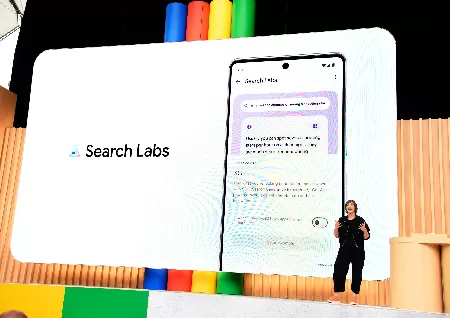Google Introduces AI-Generated Text Summaries to Search Results

In response to ChatGPT's challenge, the King of Search introduces a function that can answer searches with text summaries of material obtained online.
Google didn't appear to be concerned about its search business six months ago. Then came OpenAI's ChatGPT, and Microsoft's Bing created a chatbot.
Google revealed today at its annual I/O conference that it will infuse search results with generative artificial intelligence technology similar to that used in ChatGPT. The business is releasing an experimental version of its valued search engine that includes text generating capabilities similar to those used by ChatGPT and other smart chatbots.
Google's reinvented search still requires you to type a question, and it answers with connections to websites, bits of material, and advertisements. However, in certain cases, the top of the page will have text synthesised by AI that collects information from many sources throughout the web and connects to those webpages. To obtain more particular information, a user might ask follow-up questions.
A question regarding Britain's new king's coronation may be answered with a couple of words recapping the occasion. When questioned about e-bikes, Google's algorithms may provide bullet-point summaries of product evaluations published by various websites, as well as links to online storefronts where a consumer can purchase them. The updated version of search will be available in the United States through a new feature called Search Labs, although it will not be enabled by default or for all Google users.
Google's AI-powered search is far gentler than ChatGPT, abandoning an anthropomorphized character and avoiding potentially contentious topics like politics and medical or financial advice. When asked if Joe Biden is a decent president or for knowledge on abortion legislation in various US states, for example, Google's generative AI product declined to respond.
"The technology is very early on; it has its challenges, and we will certainly make mistakes," says Liz Reid, vice president of search at Google, who offered WIRED a first peek at the new features ahead of I/O.
Google is swiftly adding ChatGPT-like search tools, but whether consumers will find them useful remains to be seen. Product searches, for example, synthesised information from various evaluations, although it was not immediately clear how the quick summaries could improve the search experience.
The rough appearance of these new features may indicate their defensive nature. Google has invested massive sums and significant resources on AI in recent years, with CEO Sundar Pichai frequently referring to the firm as "AI first." Nonetheless, Google was caught off guard by the advent of ChatGPT, a very intelligent and garrulous—but fundamentally flawed—chatbot from OpenAI.
ChatGPT is driven by a machine learning model that has been taught to anticipate the words that are likely to follow a string of text by digesting massive volumes of text, including massive numbers of web pages. ChatGPT improved its ability to answer questions and conduct a conversation after receiving further training from people who rated the quality of the bot's replies.
Because ChatGPT was trained on a large portion of the internet, consumers immediately discovered it to be a promising new way to search, even though the bot is prone to inventing information. Microsoft capitalised on this opportunity by investing $10 billion in OpenAI in January, followed by the integration of ChatGPT into Bing a month later.
The excitement and tremendous interest from consumers, who sent millions of inquiries to ChatGPT and Bing Chat, left Google scurrying to catch up. Researchers at the business had created some of the key technologies used in the new chatbots, but Google was hesitant to publicly debut LaMDA, its forerunner to ChatGPT.
Google shifted its tactics in March, unveiling Bard, a ChatGPT rival. Google said in April that it will merge its AI research division with DeepMind, another Alphabet subsidiary focusing on AI. Google's fundamental product, search, is now including text-generation technologies.
Because of Google's strength and reputation, this current step might be the most significant test yet of the power and use of ChatGPT-style technologies. It's also dangerous.
Because language models might be manufactured, businesses must devise methods to ensure that the information supplied to consumers is correct. Furthermore, some web publishers are concerned about search engines skimming and regurgitating their material, resulting in fewer referrals. Google must also avoid cannibalising its search advertising business, which accounts for a sizable portion of the company's income.
Google’s cautious rollout "suggests they are not ready for any major changes to search yet," says Aravind Srinivas, CEO of Perplexity AI, a startup also working on generative AI for web search. He claims that Google's decision to combine generative material with traditional search results rather than replace them demonstrates the company's reluctance to disrupt its search advertising business.
ChatGPT's and other sophisticated AI models' capabilities have done more than shake Google. Some scientists are concerned that they indicate rapid AI growth, which might lead to technology that is more difficult to govern and control. Geoffrey Hinton, a pioneer in the area and once one of Google's most regarded researchers, recently left the firm to raise awareness about the risks he feels these AI models pose.
Google is introducing a dizzying array of new projects and services at I/O that make advantage of the generative AI found in ChatGPT. However, its initial efforts to integrate the technology into a dominating search offering may be the most significant for its many consumers and the firm itself.
Related queries to this article
- AI
- search engine
- ChatGPT
- text-generating capabilities
- smart chatbots
- OpenAI
- generative artificial intelligence technology
- I/O conference
- Search Labs
- text summaries
- web sources
- follow-up questions
- product evaluations
- defensive nature
- Bard
- search advertising busines
Read more articles and stories on InstaSity Trending Topics.





